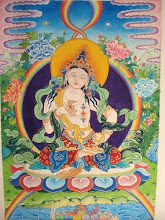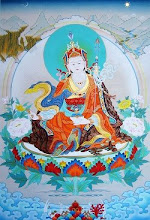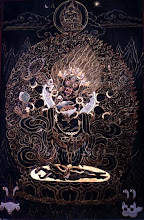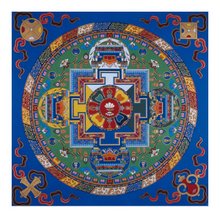Now that exams have finished, it's time to go back to Japan. I'll be leaving for Bangkok tomorrow, arriving in Japan on Sunday. It's been nearly 7 months since I arrived in Kathmandu; altogether I spent nine months here in 2007/08. When not drawing, I've been writing this week, trying to sort out all the ideas that have been percolating the past year. I offer a selection here to those that might be interested. I realize most will not want to read through all this. And that's fine. I probably wouldn't want to read it, either.
The unteachableIf art could be taught, every painter would be a
Michelangelo, every musician a Mozart, every writer a Shakespeare. What can be taught are some of the basic forms, as well as approaches or philosophies – how to conceptualize the creative process. From an artist's point of view, it's quite natural, as a method of instruction, to say to the student, “Here, copy this.” The artist himself in most cases has no idea how he does what he does. He is simply able to do it. And the only way other people can learn it, it may seem to him, is to ask students to do what he did – spend long hours copying. In fact that's what many of us did before going to art school. We hoped through more formal education to learn something more. At
Tsering I spent a lot of time drawing, copying Buddhas and other elements of
thangka such as flowers, clouds, fire, and the auspicious symbols. And for the first time in my life I used brushes and colors and learned, through repetitive practice, a few simple color techniques. But I wasn't taught very much. Much of what I leaned was through the process of doing, noticing and reflecting. We learn deepest when we do and think for ourselves, but still – I wish there had been more happening at
Tsering.
A house is not a homeThere is no “I” apart from the idea of “I.” What I think of as “me” is a collection of feelings, thoughts, and physical sensations, each one a reaction to a stimulus that is itself a reaction to a stimulus, an infinite regress of cause and effect. In all of this, there is no “I” separate from the web of causality. Buddhists illustrate this illusion with the idea of a house, but I think the idea of home might be even better. For what is “home” but an idea? The structure is not home, but a house or apartment. The location is not home, but some dirt. The people are not home, just one or more
homosapiens. So where is this thing called home? It exists only in our minds as an idea. The same is true of “I,” a bundle of sensations, thoughts and feelings on which is projected an idea of unity. But where is it? Look for it. It can't be found.
I am the universeIf there is no “I,” then what is this bundle of feelings, thoughts and sensations but an expression of the universe?
Thich Nhat Hanh has a wonderful teaching that begins by looking in the palm of your hand. There, he says, if you look closely, you can see clouds. Clouds that bring rain and nourish the plants, plants that are harvested, distributed and cooked so that you may consume them to nourish your body. The clouds couldn't exist without the oceans, the plants and people without the rain and the sun. You couldn't eat unless someone planted, harvested, and brought the food to market. The same is true for your parents, who planted and nurtured you. Looking carefully this way we begin to see the web of causes and conditions that connect us with everyone and everything in the universe. There is nothing that stands apart from the universe. There are clouds in the palm of your hands.
Doing happensWe like to think that bad things happen to us, that bad things come to us unbidden and unwelcome, often through no cause or fault of our own. But what happens is really what we do – and what we do is what happens. As there is no “I,” only an infinite regress of cause and effect, it seems there is very little of what we call free will. Take any choice or decision that you have made and ask yourself why you made it and what you will find is that you have begun a long regression of questioning, one that moves from you to outside you, eventually taking in the universe. And as the universe happens, so we happen. What happens is what we do - and what we do is what happens.
No escapeWhat we all want is to live without suffering. But this is impossible. For how can we know joy, without knowing sadness; how can we know we are happy, without first being sad; how can we live in contentment, before living through moments of fear and anxiety?
The enlightened still struggleThe Buddha said we can escape suffering. By this he meant something different than living without sadness, living without loss, without physical or mental discomfort. By suffering he meant “dissatisfaction.” Life for most of us, he observed, is dissatisfying. We have moments of great joy and happiness, but they soon end and we're back to feeling like something is missing and go off again in search of that next moment of joy, that next hit of happiness. For this, the Buddha said, there is an end. And it is in accepting that all things are impermanent. Everything comes – and goes, including our feelings, our thoughts, and emotions. In order to be liberated, to be enlightened, one must perfect non-attachment. Don't cling to the pleasant; don't try to get rid of the unpleasant. Watch them come, and watch them go. Appreciate them for what they are – and dissatisfaction will be extinguished. This enlightened mind is one that can be learned. The Buddha said that the average monk can reach this state after seven years of diligent daily practice. For the laity, it may take longer. This state of mind is a slow unfolding. There may at some point come an “ah ha!” moment, where everything comes together in a flash of insight, but that moment fades and you're back to peering at the world through your bag of skin. The process of enlightenment continues; the daily effort to live enlightened continues; it has not been miraculously washed away so that you can now live at ease and without effort. For all beings enlightenment is a slow unfolding of awareness and wisdom, not an overnight conversion.
Perfection in imperfectionThe universe is perfect as it is. It does not need improving; there is nothing better for it to become. Everything that exists is a result of causes and conditions, all of which can be nothing more than what they are. That means, therefore, that we are perfect as we are. We may aspire to something more, we may feel below standard, but these are illusions spun of clinging and aversion. When I draw, I am painfully aware of the smallest imperfection. I erase and draw again. Erase and draw. Erase and draw. But still, my ego is not satisfied. I desire that my lines replicate the lines I copy. This perfection – this level of skill - does not yet exist and so at some point, in order to complete the drawing, I have to accept that the causes and conditions that have brought me to this point are perfect and that my drawing is for this time, this place, this set of causes and conditions, perfect. I look closely at the work I copy and count the asymmetries; the master himself had to settle that day for his own level of perfection. To rest where we are is to touch our perfection.
Nothing to hateIf the universe is perfect, if everything exists as it should, then what is there left to hate? Do you hate a rock for being a rock? It is what it is. The same is true for those who seem to hurt or harm us. They are what they are because of all the causes and conditions that brought them into existence, that brought them into our orbit, that produced the action that triggered our anger. That anger, though, comes from some sort of expectation of how others should behave. We have imposed conditions on the universe; let the universe be and hate dissipates.
Living spontaneouslyThe past is what is known. We can remember it, but our remembering takes place now. The future is what is not yet known. We can think of it, but we think of it now. In the present. There is no other moment than NOW. This moment. This second. The eternal now. It's like standing in front of giant wave of water that never stops, that keeps coming and coming, breaking on our bodies over and over again, second by second, moment by moment. If there is no “I,” if there is no will, if all is perfection, then not only can't the water be controlled, but there is no need - the water is perfect as it is. In which case the only way to live is like a surfer, riding on the crest of the wave, always in the moment, attune to the balance of force, looking ahead, and never thinking too much about what the mind and body is doing.
Jesus is just alright with meOne of the more interesting books I've read in Nepal is Nobel Peace Prize nominee
Thich Nhat Hanh's Living Buddha, Living Christ. Fundamentally there is not much difference, he argues, between Buddhism and Christianity. If we accept that God and nirvana are words beyond concept, “then even [this] one notion (God/nirvana) is enough to block access to the ultimate...” Truth, he notes, has no boundaries. “Our differences may be mostly differences in emphasis.” He observes that many personal and social problems are caused from a lack of
rootedness, from people having been cut off from their traditions and their cultures. To relieve their suffering, he argues that rather than encouraging people to adopt alternate theologies, we must help them return to their own traditions. And as he advises, so he teaches, asking western Buddhists to reexamine their Christian and Jewish traditions, to find there the values they went in search of among the cultures of Asia. “...many people,”
Thich Nhat Hanh knows, “need to go away before they realize they do not need to go anywhere.”
In some respects my experience has proven this true; in others not. Going away opens you to new ways of living, ways of living that challenge habit; it helps you see the ocean, where before all you could see was water breaking on the prow. It helps to loosen the barnacles that have accumulated over the years, barnacles of habit and prejudice that can then be more easily removed. This book piqued a curiosity in discovering the parallels in Christian and Buddhist thinking, and led me to see how some of the more sophisticated thinkers (such as Thomas Merton, Alan Watts, Stephen Batchelor,
Thich Nhat Hanh,
DT Suzuki) can delicately and beautifully transcend both traditions.
Learning to live withoutYou might imagine that life here is a great hardship. We have no electricity 8 hours a day. Hot water is not always available on demand and so sometimes you have to do without a shower (which unless you're doing hard physical labor is not really a problem in winter). There is no heating in many homes outside of extra blankets. There are sporadic shortages of fuel and water. Laundry is done by hand, drying by the sun. Meat is available, but for health reasons is best avoided. The average diet is healthy but does not include much variety – largely rice, lentils, and a small assortment of fruits and vegetables. Imported goods are not available in such great abundance and having things sent can be quite expensive since the post office is not reliable. The
internet moves at a snail's pace and mobile service is often sporadic. At first it all seems too much. But you get used to it. You adapt. And once you do you find that your life is not any worse than when you arrived. In fact, it's better because you have learned that the things you thought were essential to life are in fact not essential at all, that your sense of contentment is based on things other than whether you can use the
internet whenever you like, take a shower whenever you like, eat any kind of food whenever you like.
TodayThe only thing certain is death. It can come at any moment. I could fall down the stairs, eat something poisonous, be hit by a car, be electrocuted, slip in shower, experience a heart attack, fall off the balcony ... there are innumerable ways to die. Today could be my last day. My last sunrise, the last time to hear the birds sing, to hear the children in the street laughing, to hear the monks chanting, to draw a Buddha, to paint a leaf, to share a smile with a classmate, to walk around the stupa, to feel the sunshine, to smell incense, to light a candle, to look at the stars, to talk to Mutsumi. To feel alive, to feel the universe. This could be the last. I want to live it open and aware. Open to all the possibilities that present themselves. Open to good, bad, happy, sad – taking them all, appreciating them all. Like the water, like the earth, like the air – touching everything, discriminating against none. Aware of my thoughts, action, and speech, careful not to cause harm, attentive to opportunities to help. This is how I end each morning's meditation, preparing myself for the day and especially for the last day.
The futureWhat am I to do now? School has finished, but my skills as an artist are still very rudimentary. I would like to continue to develop and create more refined work. Like the musician, like the athlete, like the computer programmer, progress is measured in the amount of time devoted to practice. Time for each of us is finite. We must choose how to use it. Thinking of all the things possible in the world, there are many things that I can do. I can go back to teaching. I can go back to radio. I can go back to school and get a PhD. I can help
Mutsumi with her growing amount of translation work. I can study photography. I can study writing. All these things present interesting challenges and will reward with moments of great creative satisfaction. But it is difficult to find time to do them all, or do them all well. So a choice must be made. And for now I would like to continue to develop my art skills. The challenge on returning to Japan will be not only to set aside the hours and days for practice, but also to jealously guard that time from those who will impose on it with offers of work.
#












































